- In his new book, Morgan talks best interviews, awkward guests and life as a Brit in ths U.S.
- Piers Morgan: "I don't see the need for assault weapons in the hands of civilians"
- "I think guns in the right hands, for the right use, are perfectly legitimate," said the CNN host
- Morgan on Bill Clinton: "He has a brilliant overview of almost any issue in the world"
(CNN) -- Piers Morgan's book "Shooting Straight: Guns, Gays, God, and George Clooney" hits shelves Tuesday, and the "Piers Morgan Live" host recently sat down with CNN Digital to discuss the book, his career as a newspaper editor and TV host, taking over Larry King's time slot, his passionate stance on gun control and much more. Here is an edited version of that discussion. CNN: Your book begins and ends with a discussion on gun violence. What are your thoughts on guns?
Piers Morgan: I think that there's honestly a huge cultural issue in America, which barely applies anywhere else in the world. Certainly not anywhere I can think of in Europe, for example. And that is that the Second Amendment has been hijacked, in my view, by the NRA so that the original meaning -- which was accepted for 150-plus years -- was supposed to apply to a well-regulated militia. So if you had your little area, wherever you were in America, and you had a militia, then you're entitled to bear an arm as part of that well-regulated militia. Hence the phrase "well-regulated."
What the NRA did in the '80s is, they hijacked it and put huge political pressure on it until eventually the Supreme Court ruled a few years ago that, actually, it meant an individual's right to bear arms -- which it was never intended to be by any close examination of the history of the Second Amendment wording. So what has happened now is that you just have this insane situation where I can go to a Wal-mart in many cities in America, and I can't buy a Kinder Surprise egg, which is a little egg that has a little toy inside. You can't buy those in America; they're illegal, because you may choke on the little toy.
You can't buy certain types of French cheese because they're bad for you bacterially, but you can go to the wall and pick up an AR-15 assault rifle, capable of firing 100 bullets a minute, and nobody seems to think this is strange in America.
These killing machines that have been used in 90% of all the mass shootings since I've been in America are just that easily available. And if you want to buy 6,000 rounds of ammo, you get on the Internet and you buy it, as we saw the guy in Aurora did. To me, the old culture of America -- of the right to have a gun to shoot or hunt or for sport or even to defend your home -- I get that. What I don't think there's any legitimacy for is assault weapons.
CNN: Did the 1996 school shooting in Scotland you talk about in the book change your opinion on guns?
Morgan: I come from a military family. My brother is a British army colonel. My mother's brother was a British army officer. My sister married a British army officer. My grandfather was a commando. It's not a hatred of guns. I think guns in the right hands, for the right use, are perfectly legitimate. In Britain, we'd probably be speaking German -- as many Americans like to remind me -- if we hadn't stood up with the Americans to the Nazis. There are times when you have to.
I'm not a pacifist at all, but I don't see the need for any assault weapons in the hands of civilians. And nobody has convinced me of one. If somebody wants to have a handgun in America to defend their family at home that is kept under lock and key, I can understand that. But that is a way different situation than everyone walking around with a right to an AR-15.
CNN: How did you react when you heard that 100,000 people wanted you deported?
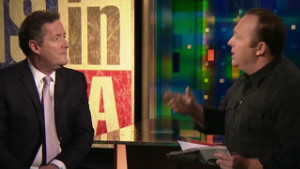 Morgan debates man who wants him deported
Morgan debates man who wants him deported
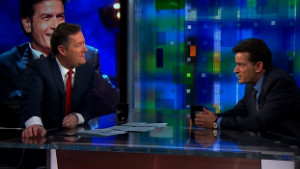 Sheen: Piers is 'a pro'
Sheen: Piers is 'a pro'
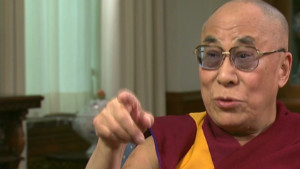 Dalai Lama tempted by women? 'Oh, yes'
Dalai Lama tempted by women? 'Oh, yes'
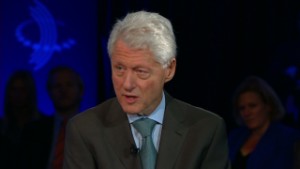 Bill Clinton on Putin and Syria
Bill Clinton on Putin and Syria
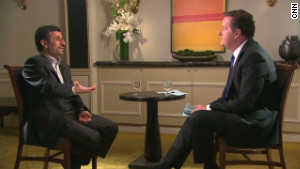 Ahmadinejad calls homosexuality 'ugly'
Ahmadinejad calls homosexuality 'ugly'
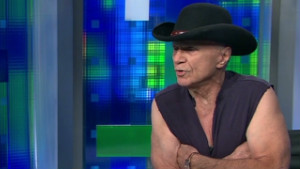 Morgan to Blake: Are you 'sane'?
Morgan to Blake: Are you 'sane'?
Morgan: I didn't mind all that. I thought it was quite entertaining. And of course it was Alex Jones who was the guy that started it all. Then we brought him on the show, and he revealed his true colors. I was pleased that what he did was, it forced the White House to make a statement which recognized my rights under the First Amendment to freedom of speech.
I'm not trying to grab people's guns. Not a single proposal that I've seen by anyone in Washington actually means anybody's gun gets taken away. This is all about, as you move forward, what type of guns should be in civilian hands going forward. And nobody can explain to me why anyone needs killing machines other than to kill lots of people.
CNN: How did you feel about "replacing" Larry King on CNN?
Morgan: I didn't really replace Larry King. He's irreplaceable. He's an absolute legend. I started from a position where no one had seen me do an interview on American television. Americans had only seen me do "Celebrity Apprentice" and "America's Got Talent." Nobody even knew if I could do news even though I'd run a daily newspaper in Britain for 10 years. So there was a lot of doubt, a lot of skepticism, a lot of pressure because I was in my mid-40s, I had an English accent, and I'm trying to replace one of the great iconic American television figures. So it was big pressure.
CNN: One of your earliest interviews was with Charlie Sheen around the time he was dismissed from "Two and a Half Men." What was that like?
Morgan: He said to me "I'll definitely be there," because he was very unpredictable at the time. So we got to five minutes before airtime, there was no sign of him, and I was panicking. We had no real Plan B. We were just waiting for him to pull up. Then he turned up in this huge Maybach car, got out with the oddest-looking entourage you've ever seen, and said to me "Hey, man, let's go roll!" We went in, and he gave me an incredible hour of television. The ratings were astronomic, and it was an amazing coup for us at the show, and it did Charlie favors, too.
CNN: Tell us about some of the best interviews you've conducted, either at CNN or in newspapers.
Morgan: I've done a lot that I've really enjoyed. As a print interviewer, I had some big exclusives at The Daily Mirror. I was the only British newspaper journalist to interview Michael Jackson in the last 20 years of his life. I got the first interview in the world with the bodyguard who survived the Princess Diana car crash.
In Britain, I had a track record for doing a talk show which attracted everyone from the prime minister at the time, Gordon Brown, to Simon Cowell to Elton John and so on. My favorite interview at CNN was the Dalai Lama, who told me he'd never had a cigarette, never taken a drug, he'd never taken any alcohol, he'd never had sex, never watched television, had never seen a movie, nor does he listen to music. Quite amazing.
CNN: Who's your dream interview? Who is your "white whale"?
Morgan: Jack Nicholson would be good. He's my favorite actor, and I think he's the most enigmatic celebrity in the world.
CNN: In the book, you discuss confrontations with people such as Margaret Thatcher, Alex Jones and others. Do you enjoy confrontation?
Morgan: I don't shy away from it. I think it's in the British spirit to be quite confrontational.
CNN: What would you say was your most uncomfortable interview?
Morgan: Alex Jones wasn't easy, obviously. He was screaming his head off in my ear about 1776, so that was very uncomfortable. Kelsey Grammer was not uncomfortable, because he never even got on air. He just disappeared, and that's a nightmare when you've got a big star as a guest for half the show and he just disappears because he has a hissy fit in the green room. So that was pretty awkward.
CNN: As a Brit working in America, are there ever stories or moments you feel like you can't or shouldn't comment on?
Morgan: No, I mean, I'm always mindful that, you know, as Stephen Colbert said -- in his character -- when I went on his show: "Have you any idea how annoying it is to be told how to lead our lives by someone with your accent?" Jay Leno said to me, "What you're doing with guns is like going to Germany and telling them they can't speed on the Autobahn in their cars. They don't want to hear it. Particularly not from your accent."
And so I'm mindful that I'm a visitor to this country. I'm a resident in the U.S. I love America. I love Americans, and I feel incredibly grateful that I'm able to ply my trade here.
CNN: Can you talk about the stress of being accused in the Newscorp phone hacking scandal?
Morgan: I wouldn't say it was stress. It was more like the Ghost of Christmas Past banging on my door. I hadn't actually worked in British newspapers since 2004, and suddenly I was hauled into this inquiry simply because of stuff that I myself had written and said in the past, which had been completely misconstrued.
To this day, what I'm pleased about is that despite all that noise that was around at the time, two and a half years later no journalist that worked under me at The Daily Mirror has been arrested in connection with any alleged offense at the paper during my 10-year tenure as editor. I've always believed the Mirror operated within the law and everything so far has pointed to that belief being correct.
CNN: Talk about some of your interviews with politicians.
Morgan: I love Bill Clinton. He's my favorite of all the politicians because he's just got unbelievable charisma, an incredible sense of history and knowledge of history. He's got an amazingly direct way of talking to you. He looks you in the eye. He's very engaged; he makes you feel very important when you talk to him. He has a brilliant overview of almost any issue in the world. And he's funny; he's charming. I bemoan the 22nd Amendment, which prevents him from being president again! Rudy Giuliani I really like. We don't agree with much politically, but I love him as a character, and he's always had great value.
CNN: What are your reflections on some of the current and former world leaders you've interviewed?
Morgan: Mahmoud Ahmadinejad was a pretty dramatic interview. It was the only full interview that he gave when he came in for the U.N. General Assembly last year, and it was pretty tense. I think I gave as good as I got. He's a tricky customer to interview. He didn't want to talk about his denial of the Holocaust or about his treatment of gays in Iran, but I wasn't going to let him off the hook and I gave him quite a hard time.
CNN: You've had some great conversations with newsworthy and sometimes polarizing people, Robert Blake for instance.
Morgan: Robert Blake was a total nutcase. It was the only time I ever had CNN security guards actually come into the studio during an interview. They genuinely feared that something might happen to me because Robert Blake was getting very threatening. I think he also broke the world record for the number of f-words in one hour. I think it was 46 or something. He's, as we would say in Britain, one sandwich short of a full picnic.
CNN: You talk about the fictional character of Will McAvoy in your book. What kind of impact has HBO's "The Newsroom" had on your show?
Morgan: Watching the pilot episode, I could absolutely identify with Will McAvoy's dilemma. Which is he was basically taking over, coming out with his show, but what did it really stand for? What was his voice? And then he suddenly erupted about the state of America, and then he never went back. That always became his reference point.
And I just had to find something that was completely natural. I didn't decide then and there that it would be guns, although I had already had a lot of stuff about guns on the show, but when gun outrage just got more and more catastrophic -- like Aurora, for example -- that's when I really did feel like I had found my voice. And it was important for the show to have that because it gave me an identity in America where people knew what I stood for. I stood for not as people would like to believe -- taking people's guns away who are law-abiding citizens -- but stopping so many Americans being killed by guns.
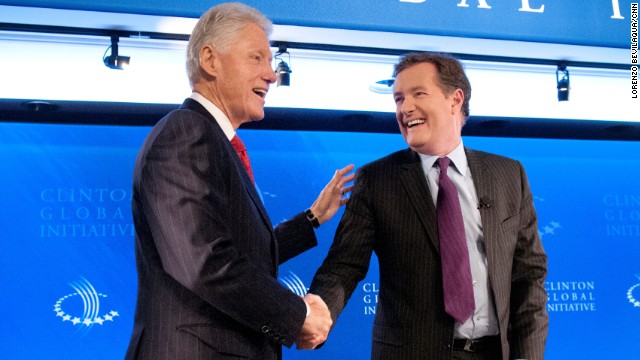 In his book "Shooting Straight," CNN's Piers Morgan wrote that Bill Clinton remains "the smartest, most eloquent and popular politician in the world today."
In his book "Shooting Straight," CNN's Piers Morgan wrote that Bill Clinton remains "the smartest, most eloquent and popular politician in the world today."
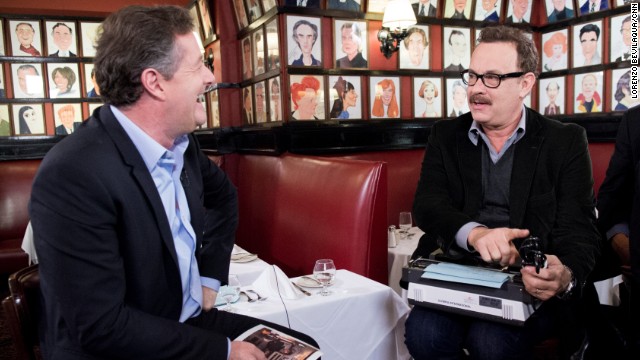 "I finally got my man," Morgan wrote of booking Tom Hanks as a guest.
"I finally got my man," Morgan wrote of booking Tom Hanks as a guest.
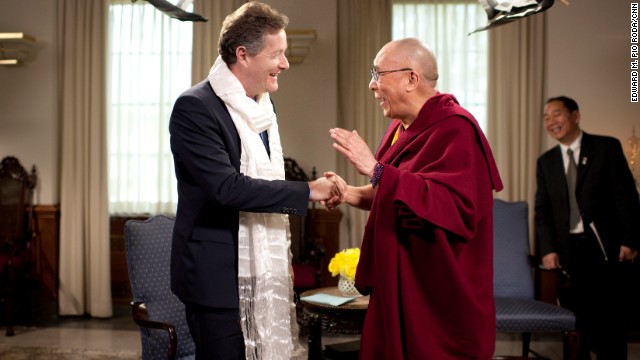 The Dalai Lama presented Morgan with a white Tibetan khata ceremonial scarf. "He exudes such warmth and serenity," wrote Morgan.
The Dalai Lama presented Morgan with a white Tibetan khata ceremonial scarf. "He exudes such warmth and serenity," wrote Morgan.
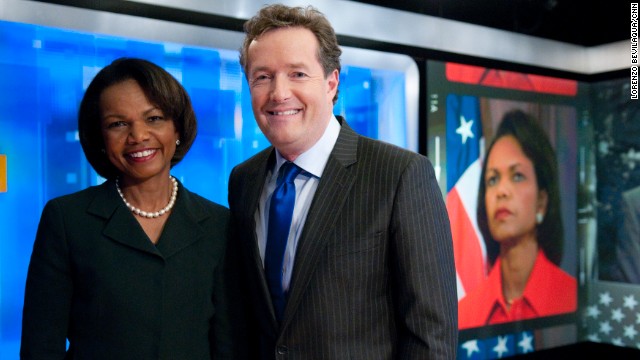 After discussing Iraq, Afghanistan, George W. Bush and 9/11 with Condoleezza Rice, Morgan asked her how a man could "woo" her, to which the former secretary of state replied, "Convince me that you'll spend Sunday afternoon watching football, and I'll even cook."
After discussing Iraq, Afghanistan, George W. Bush and 9/11 with Condoleezza Rice, Morgan asked her how a man could "woo" her, to which the former secretary of state replied, "Convince me that you'll spend Sunday afternoon watching football, and I'll even cook."
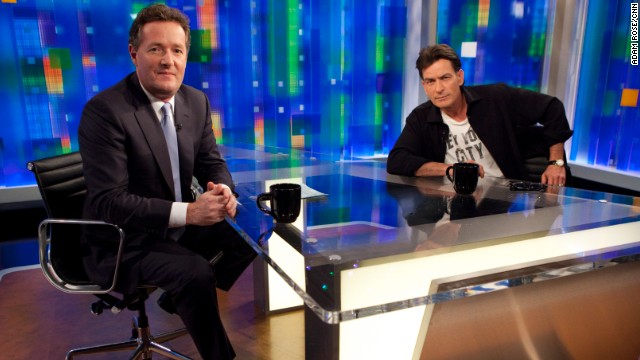 Morgan called Charlie Sheen's February 2011 "Piers Morgan Tonight" appearance "an electrifying interview, one of those times when you know it's going to make news, and anything can happen."
Morgan called Charlie Sheen's February 2011 "Piers Morgan Tonight" appearance "an electrifying interview, one of those times when you know it's going to make news, and anything can happen."
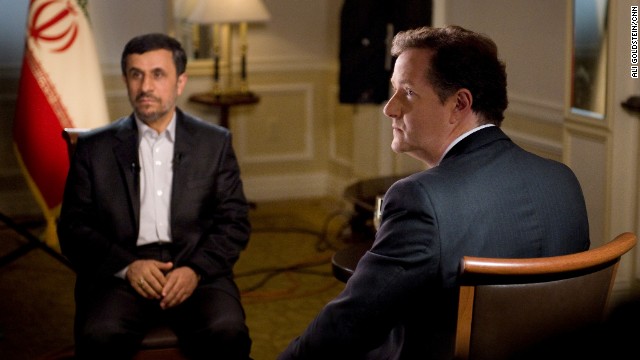 "Like most despots," Morgan wrote of Iranian President Mahmoud Ahmadinejad, "he's a weird mixture of charm, ruthlessness, outrageous opinions, and a very sinister stare."
"Like most despots," Morgan wrote of Iranian President Mahmoud Ahmadinejad, "he's a weird mixture of charm, ruthlessness, outrageous opinions, and a very sinister stare."
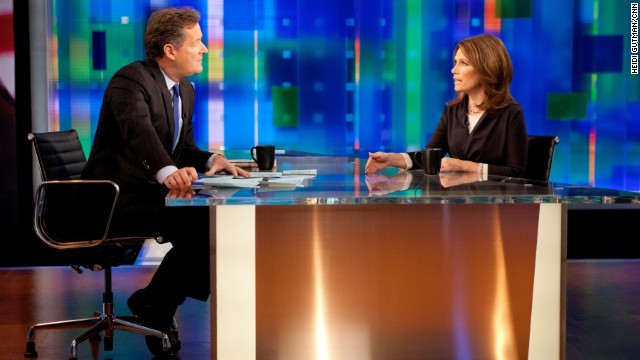 When former presidential candidate Michele Bachmann was a guest on his show, Morgan grilled her on some of the anti-gay statements she's made.
When former presidential candidate Michele Bachmann was a guest on his show, Morgan grilled her on some of the anti-gay statements she's made.
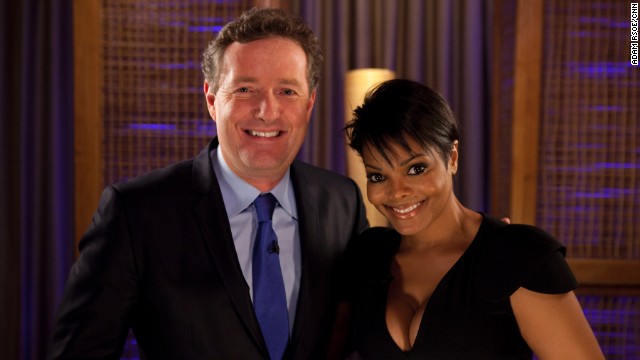 In the book, Morgan called his interview with pop legend Janet Jackson "a fascinating insight into the weird, fantastical world of the world's most famous showbiz family."
In the book, Morgan called his interview with pop legend Janet Jackson "a fascinating insight into the weird, fantastical world of the world's most famous showbiz family."
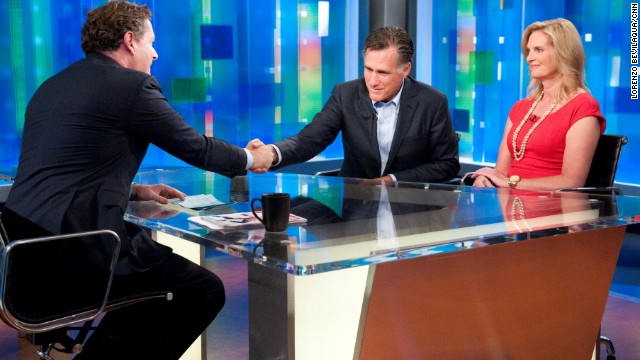 Morgan recalled that when he sat down with Mitt and Ann Romney in 2011, the GOP presidential candidate refused to say whether he believed homosexuality was a sin.
Morgan recalled that when he sat down with Mitt and Ann Romney in 2011, the GOP presidential candidate refused to say whether he believed homosexuality was a sin.
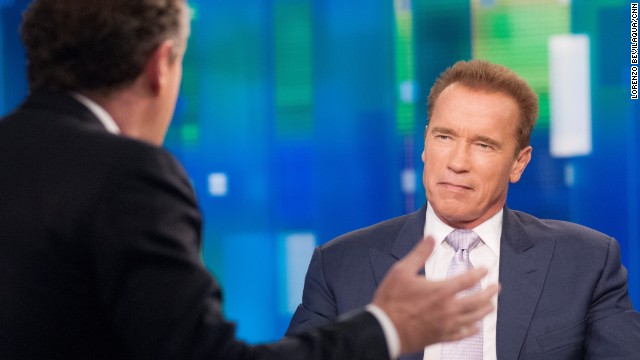 Morgan interviewed Arnold Schwarzenegger not long after the actor and former governor of California addressed his affair, love child and separation from wife Maria Shriver in his autobiography. "Gone was all the old Schwarzenegger bravado," wrote Morgan, "replaced by a somber, reflective, and astonishingly self-critical version."
Morgan interviewed Arnold Schwarzenegger not long after the actor and former governor of California addressed his affair, love child and separation from wife Maria Shriver in his autobiography. "Gone was all the old Schwarzenegger bravado," wrote Morgan, "replaced by a somber, reflective, and astonishingly self-critical version."
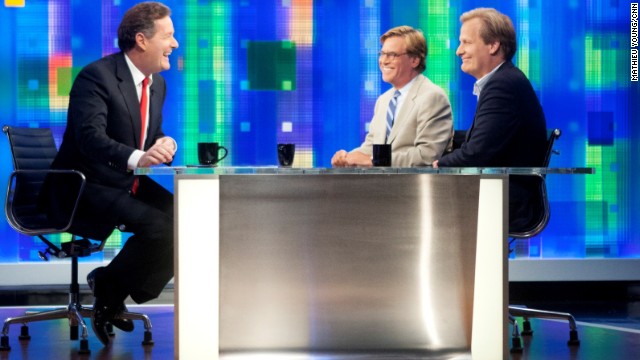 Atlantis Cable News, the fictional network of HBO's "The Newsroom," is loosely based on CNN. Morgan, who interviewed star Jeff Daniels and creator Aaron Sorkin in June 2012, credited "The Newsroom" with showing him that "a voice" was missing from his own show.
Atlantis Cable News, the fictional network of HBO's "The Newsroom," is loosely based on CNN. Morgan, who interviewed star Jeff Daniels and creator Aaron Sorkin in June 2012, credited "The Newsroom" with showing him that "a voice" was missing from his own show.